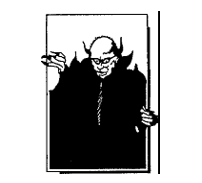One morning recently, National Public Radio offered its listeners an interview with a Texas mass murderer to go with their cornflakes. This monster, who had confessed to 250 or so murders, told the reporter that some of them were “sacrifices to Satan.” Aghast, the reporter asked, “You don’t really believe in Satan, do you?” (He did.)
In the world according to NPR, it seems, mass murder gets more respect than religious belief, orthodox or perverse.
In actual fact, the “N” in NPR should probably stand for Northeastern (and the “P” for People’s). Sure, the network drags in a lot of Californians to comment on this and that, serves up a few domesticated Southerners and other regional and ethnic specimens, and “Prairie Home Companion” is another story, but for the most part the NPR sensibility is Northeastern-yuppie secular humanism, if you’ll excuse the expression.
Take this Devil business. The reporter seemed surprised that anybody, even a mass murderer, believed in the Devil. Well, the last figures I saw on that (in an article by Clyde Z. Nunn in the Autumn 1974 issue of Listening: Journal of Religion and Culture) put the percentage of Southerners who were absolutely certain that Satan exists at 72 percent—up from 53 percent nine years earlier. To be sure, only 29 percent of Northeasterners believed in Old Nick (and that figure had decreased from 33 percent in 1964), but, overall, 50 percent of all Americans believe unreservedly, and another 21 percent said it was “probably true” that Satan exists. And belief was increasing everywhere except in the Northeast.
Who’s out of touch here?
Another example: When a movie reviewer on All Things Considered discussed a movie that hinged on whether its two main characters—”married (in the words of the country song) but not to each other”—would or would not commit adultery, the NPR anchorwoman professed disbelief that two adults, these days, would hesitate. Well, I don’t have the numbers on it, but I can testify that there are lots of folks out here in the provinces (and even some in the Northeast, if you look for them) who try, sometimes successfully, to keep the Commandments, even the seventh.
The fact is that religion is still a force to be reckoned with in American life, although you wouldn’t know it to listen to NPR (or, as Benjamin Stein pointed out recently in the Wall Street Journal, to watch prime-time television). Leave aside the fact that it is pernicious to have “opinion leaders” so out of touch with the country that supports them—I suggest that it’s dangerous. Look at what happened to the Shah.

Leave a Reply